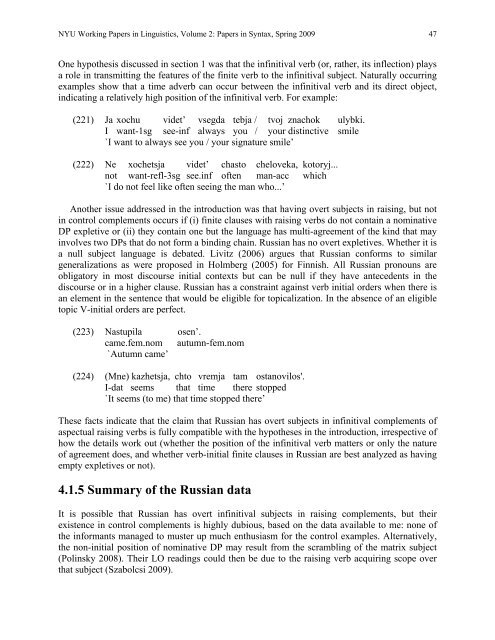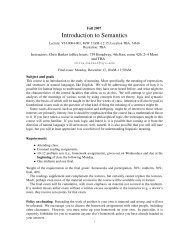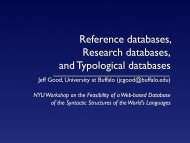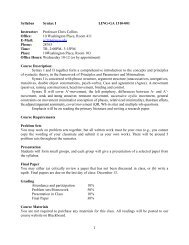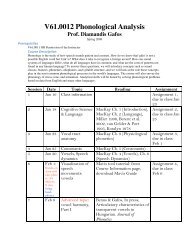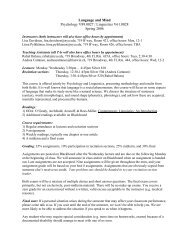Overt Nominative Subjects in Infinitival Complements Cross - NYU ...
Overt Nominative Subjects in Infinitival Complements Cross - NYU ...
Overt Nominative Subjects in Infinitival Complements Cross - NYU ...
Create successful ePaper yourself
Turn your PDF publications into a flip-book with our unique Google optimized e-Paper software.
<strong>NYU</strong> Work<strong>in</strong>g Papers <strong>in</strong> L<strong>in</strong>guistics, Volume 2: Papers <strong>in</strong> Syntax, Spr<strong>in</strong>g 2009 47One hypothesis discussed <strong>in</strong> section 1 was that the <strong>in</strong>f<strong>in</strong>itival verb (or, rather, its <strong>in</strong>flection) playsa role <strong>in</strong> transmitt<strong>in</strong>g the features of the f<strong>in</strong>ite verb to the <strong>in</strong>f<strong>in</strong>itival subject. Naturally occurr<strong>in</strong>gexamples show that a time adverb can occur between the <strong>in</strong>f<strong>in</strong>itival verb and its direct object,<strong>in</strong>dicat<strong>in</strong>g a relatively high position of the <strong>in</strong>f<strong>in</strong>itival verb. For example:(221) Ja xochu videt’ vsegda tebja / tvoj znachok ulybki.I want-1sg see-<strong>in</strong>f always you / your dist<strong>in</strong>ctive smile`I want to always see you / your signature smile’(222) Ne xochetsja videt’ chasto cheloveka, kotoryj...not want-refl-3sg see.<strong>in</strong>f often man-acc which`I do not feel like often see<strong>in</strong>g the man who...’Another issue addressed <strong>in</strong> the <strong>in</strong>troduction was that hav<strong>in</strong>g overt subjects <strong>in</strong> rais<strong>in</strong>g, but not<strong>in</strong> control complements occurs if (i) f<strong>in</strong>ite clauses with rais<strong>in</strong>g verbs do not conta<strong>in</strong> a nom<strong>in</strong>ativeDP expletive or (ii) they conta<strong>in</strong> one but the language has multi-agreement of the k<strong>in</strong>d that may<strong>in</strong>volves two DPs that do not form a b<strong>in</strong>d<strong>in</strong>g cha<strong>in</strong>. Russian has no overt expletives. Whether it isa null subject language is debated. Livitz (2006) argues that Russian conforms to similargeneralizations as were proposed <strong>in</strong> Holmberg (2005) for F<strong>in</strong>nish. All Russian pronouns areobligatory <strong>in</strong> most discourse <strong>in</strong>itial contexts but can be null if they have antecedents <strong>in</strong> thediscourse or <strong>in</strong> a higher clause. Russian has a constra<strong>in</strong>t aga<strong>in</strong>st verb <strong>in</strong>itial orders when there isan element <strong>in</strong> the sentence that would be eligible for topicalization. In the absence of an eligibletopic V-<strong>in</strong>itial orders are perfect.(223) Nastupila osen’.came.fem.nom autumn-fem.nom`Autumn came’(224) (Mne) kazhetsja, chto vremja tam ostanovilos'.I-dat seems that time there stopped`It seems (to me) that time stopped there’These facts <strong>in</strong>dicate that the claim that Russian has overt subjects <strong>in</strong> <strong>in</strong>f<strong>in</strong>itival complements ofaspectual rais<strong>in</strong>g verbs is fully compatible with the hypotheses <strong>in</strong> the <strong>in</strong>troduction, irrespective ofhow the details work out (whether the position of the <strong>in</strong>f<strong>in</strong>itival verb matters or only the natureof agreement does, and whether verb-<strong>in</strong>itial f<strong>in</strong>ite clauses <strong>in</strong> Russian are best analyzed as hav<strong>in</strong>gempty expletives or not).4.1.5 Summary of the Russian dataIt is possible that Russian has overt <strong>in</strong>f<strong>in</strong>itival subjects <strong>in</strong> rais<strong>in</strong>g complements, but theirexistence <strong>in</strong> control complements is highly dubious, based on the data available to me: none ofthe <strong>in</strong>formants managed to muster up much enthusiasm for the control examples. Alternatively,the non-<strong>in</strong>itial position of nom<strong>in</strong>ative DP may result from the scrambl<strong>in</strong>g of the matrix subject(Pol<strong>in</strong>sky 2008). Their LO read<strong>in</strong>gs could then be due to the rais<strong>in</strong>g verb acquir<strong>in</strong>g scope overthat subject (Szabolcsi 2009).


